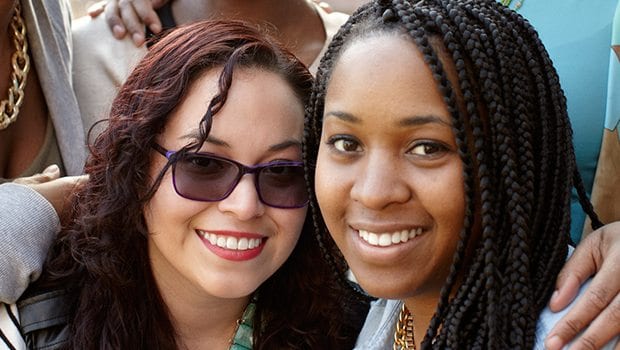

Winsor School alumna.
“Calling All Sisters.” The title of an email written to the women of color in my life.
“I’ve been ‘the only’ or ‘one of the only’ in a lot of spaces lately,” I write. “I just need people to talk to whom I love and trust, who understand where I come from.”
“I need my sisters.”
The response is immediate, emphatic. Emails pour in. Without hesitation, my sisters step forward to meet the need, to quench the thirst we have always shared.
Although the community I knew as the Winsor School’s Mentoring Program formally changed its name to SISTERS in 2008, I was still a student when the transition began. We used the phrase “Sharing Individual Stories Through Everyone’s Roots” at our End-of-Year Celebration in 2006, the 10th anniversary of the organization’s founding in 1996. Yet the true roots of our tradition are much older.
Jacqueline Arrington P’85, a founding faculty member and Winsor’s former director of health services, traces the unofficial genesis of Mentoring/SISTERS to the 1981–’82 academic year. Her daughter Courtney Arrington ’85 spent her first years at Winsor as one of two black students in the entire Lower School. When Courtney began in freshman year, Mrs. Arrington began meeting with the mothers of other black students to talk informally about their daughters’ experiences at Winsor. These gatherings held the essential core of the Mentoring Program and of SISTERS: that students of color at Winsor have a different experience than that of their peers—and need a space to talk about that experience.
Within a few days of my email, I trade messages with Ashleigh Coren, Class of ’03. She and Naomi Ryan ’03 have become an informal support group for me, providing mentoring and friendship as I navigate my first years beyond college. Their instinctive grasp of my experience comforts me as much as their company does. They have survived. I will too.
A week later, I sit down for coffee with Maura Mathieu ’06. As I fill her in on my first interracial relationship, I remember when we first met in Class V, remember sitting beside her on the JV soccer bus as she told me she was biracial. I feel anew the relief of not having to explain the reasons for my joys, my hopes, my fears for this new love.
Angela Coombs ’06 writes to propose a girls’ night for those of us still in Boston, and I recall her and Kelly Tellis-Warren ’06 visiting me in college, how viscerally grateful I was to talk candidly with people who understood me—had it been months or only weeks since one of my freshman roommates revealed she had never met a black person before, turning a routine dinner into an exhaustive Q&A about me and my race?
Maia Monteagudo ’06 emails me repeatedly, persistently to catch up, and we plot ways to connect Mentoring/SISTERS alumnae and current students. She recounts her visit to Winsor’s Latina affinity group, a group our generation never had enough Latinas to found, and for a moment we’re back in Lower School, earnestly discussing plans to change the school with our diversity work, still working towards the same revolution.
These women fill, color, and make my connection to Winsor whole. Their words fill my inbox with their own hard times and resilience, with the voices and victories of the marginalized, with recommendations of artists of color that feed our hearts and minds. They reflect me—my interests, passions and concerns—in a world that tends neither to see nor to look like me. They mirror. They support. They reinforce. They inspire.
They are my sisters.
Note: Writer Weslie Turner is a 2006 graduate of the Winsor School in Boston and went on to graduate from Harvard University in 2010 with a B.A. in history and literature. She originally wrote this story for the Winsor alumnae magazine in Spring 2014.






